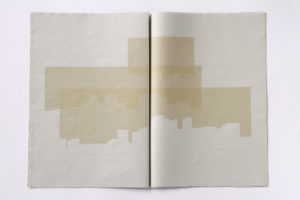
Tomislav Brajnović & Igor Eškinja
suddenly everything disappears
Curator: Giuliana Carbi, Trieste Contemporanea
Wednesday, May 18, 2016
Exhibition opening at 8 p. m.
Institute for Contemporary Art
Trg kralja Tomislava 20, Zagreb
Gallery Hours: Tuesday – Saturday 12:00 – 7:00 p. m. Exhibition remains open until June 11, 2016
Exhibition suddenly everything disappears by Tomislav Brajnović and Igor Eškinja was prepared as a site-specific project for Studio Tommaseo in Trieste, and was opened late last year, now is coming to Zagreb in a modified and adapted shape, as their first solo exhibition at the Institute of Contemporary Art in Zagreb, and their first collaboration.
The exhibition was created within the project Dialoghi con l’arte dell’Europa centro orientale which has just celebrated its 20th anniversary.
“Which fragility can be shown, which real open time can be proposed, as a “present” always vigilant on complexity, by contemporary visual art?
The two men-show, conceived by Tomislav Brajnović and Igor Eškinja for the space of the Studio Tommaseo of Trieste, puts on the table a very serious question.
The effectiveness of their proposal is disconcerting because these two great Croatian artists do not want to “scream” against our wrong plans, but only put them clearly before our eyes. They do it metaphorically, so to speak, but it is the surprising shifting of their complaint into the abstraction that makes their message clear and disturbing, as contemporary art can do.
Modern humans, especially in Western culture, have been chasing after the goal of changing the world. The failure of this goal is plain for all of us today, in times of dramatic migrations that prelude to a radical change in the future.
Tomislav Brajnović questions the possible re-definition of notions such as those of artist, history, culture. He works on fragments of common histories, he makes small printing or installative interventions on found objects in order to report in “present tense” a little experience of the past – but it is an experience-sample of many human experiences that have occurred… In times when too many men are put in a position of being forced to seek their “promised land”, which even today is denied to them with a violence that repeats itself for centuries, the artist – with the provocative idea of a “gentle dictator”, which he takes from the Slovenian philosopher Slavoj Žižek – is wondering how we went wrong in the past, when even the perfect beauty of art, even of the most radical art, had offered its magnificent formal part to a project that now is failing more than ever… Promised land is also the “label” printed on a fake banknote of 10 dollars, as fake as that promise…
Igor Eškinja also thinks it is possible for visual art to have a more free and radical position than other culture’s products in addressing the urgent need to talk about present, to reflect on our human condition exactly from the “distracted” view that we have on present… in which errors are always accomplished – and then they become history and we forget them. The level of metaphor he uses is even more abstract: his installation takes its first beginning from sun exposure of newspapers not yet written, collated but empty. He is interested in the paradox that his action – that in this case means “his” present – is a middle-time in the complete process that not belongs to him. These white papers are put under the sun after some shadow-shapes have placed on them, that represent the view of his city, Rijeka, with its history of socialist housing, which is depopulating. These shapes are made from objects, names of families, signs on the bells of apartments located in one only Paris district which counts the same number of inhabitants as Rijeka but coming from all over the world – an alive stratigraphy of migration. Then the artist removes the shapes and the sun and time write on these papers in all their parts and yellow them in the same manner.
Tomislav Brajnović (b. 1965 in Zagreb). Education in Den Haag, Zagreb, London. Assistant professor at the Academy of Fine Arts in Rijeka, he lives between Zagreb and Rovinj, Croatia.
Igor Eškinja (b. 1975 in Rijeka, Croatia). He graduated at the Academy of Fine Arts in Venice, Italy and lives and works in Rijeka. Both the artists have an important curriculum of solo and group exhibitions in European countries. Eškinja counts some exhibitions of his in the United States.
Giuliana Carbi is the President of the Trieste Contemporanea, art historian and curator. She is the founder of the Continental Breakfast network and of the CEI Venice Forum.
Photo: Igor Eškinja “Novi list”




